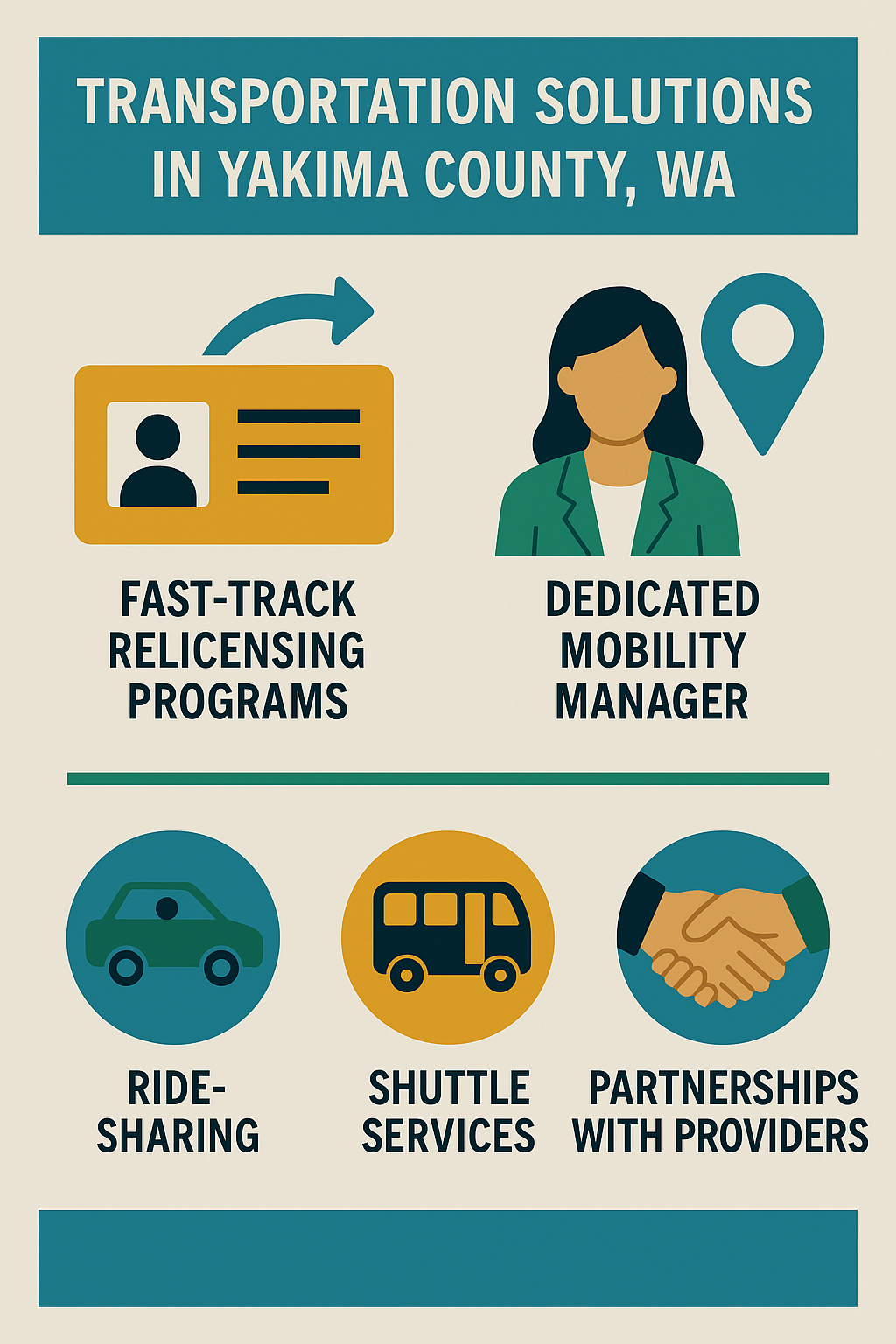 Inclusive and Engaging Transportation Planning in Rural Yakima County: A Human-Centered Approach
Inclusive and Engaging Transportation Planning in Rural Yakima County: A Human-Centered Approach
By Dr. Mark Smutny, President, Civic Reinventions, Inc.
Access to reliable transportation is a fundamental necessity for individuals and families striving to rebuild their lives. In rural Yakima County, WA and across Yakama Nation lands, approximately 200 households face significant transportation barriers. These families, deeply engaged in the child welfare system and dependency courts, need reliable transportation to attend hearings, meet with judges and attorneys, access social workers, mental health providers, and support groups. Additionally, stable transportation is critical for maintaining employment and ensuring family reunification efforts proceed smoothly. However, because these individuals have been convicted of Driving Under the Influence (DUI), they lack driver’s licenses and struggle to navigate the sprawling rural landscape where traditional transportation options fall short.
Conventional transportation planning often prioritizes efficiency over lived experiences. To develop meaningful solutions, we must embrace human-centered design principles—listening directly to these families to craft transportation options that genuinely meet their needs.
Engaging Families with Liberating Structures
Liberating Structures provide a powerful framework for fostering collaborative decision-making, ensuring that those most affected by transportation gaps actively contribute to the planning process. By using these participatory techniques, we amplify the voices of individuals caught in the child welfare system, ensuring their firsthand experiences drive solutions.
Applying Liberating Structures enriches transportation planning by creating structured yet flexible ways for stakeholders to engage. Here’s how four key methods play a role:
This simple but effective method initiates dialogue among participants by pairing them in short, rotating conversations. In a transportation planning context, we begin by gathering parents affected by transportation barriers. Individuals engage in brief exchanges—typically lasting two to three minutes—where they discuss their experiences navigating rural Yakima County without a license.
The beauty of Impromptu Networking is its ability to surface insights quickly while building relationships among people who might not otherwise interact. Parents share frustrations about missed court dates, unreliable rides, and the impact of these transportation gaps on their families. They also hear from others facing similar obstacles, creating shared understanding and momentum for collective problem-solving.
1-2-4-All is a structured way to ensure every voice is heard without allowing dominant perspectives to take over. We begin with quiet reflection (1), then discuss ideas in pairs (2), followed by small groups of four (4), and finally share the most compelling insights with the larger room (All).
This process helps parents articulate specific barriers they encounter. For example, discussions might reveal that current public transit schedules don’t align with dependency court hearings or that carpool options often fall through due to last-minute cancellations. By gradually expanding conversations from individuals to the entire group, we surface essential details that might otherwise go unnoticed. This approach provides valuable data for transportation planners, ensuring solutions reflect the experiences of end-users.
This method facilitates direct collaboration between affected individuals and decision-makers. In structured conversations, participants express clear, actionable requests to the people responsible for shaping transportation solutions.
For example, parents in the child welfare system articulate what they need from judges, social workers, public transportation planners, and nonprofit advocates. Requests might include:
- Flexible appointment scheduling that accommodates transportation limitations
- Expanded subsidies for rideshare programs
- A reliable shuttle system connecting rural areas to legal and support services
- Fast-track programs for license reinstatement
Meanwhile, transportation planners outline the logistical and budgetary constraints they face. This structured back-and-forth creates realistic expectations while fostering deeper understanding across stakeholders.
TRIZ is a problem-solving technique that challenges participants to identify counterproductive elements in a system and eliminate them. Instead of asking, “What would an ideal transportation solution look like?” we ask, “How could we design the worst possible transportation system for these families?”
Through this reversal, participants highlight barriers embedded in current approaches. They might conclude that the worst system would:
- Require people to walk several miles to access transportation
- Operate only during business hours, ignoring the realities of dependency court schedules
- Lack reliable funding, leading to inconsistent service availability
- Fail to consult the families impacted by transportation barriers
Once these dysfunctional elements are identified, we flip the conversation—asking how to ensure the opposite happens. This leads to creative, practical strategies for designing more inclusive transportation solutions.
Practical Solutions: Mobility Management and Fast-Track Relicensing
Based on insights from these families, two essential strategies must guide future transportation planning:
- Fast-Track Relicensing Programs – Many parents involved in child welfare cases could benefit from streamlined processes to regain their driving privileges. Providing expedited pathways—such as education courses, fee assistance, and mentorship—can significantly reduce long-term transportation barriers.
- Dedicated Mobility Manager – Hiring a mobility manager focused on this population ensures tailored, long-term solutions. A mobility manager can coordinate community ride-sharing options, develop partnerships with service providers, and advocate for policies that enhance access.
Investing in transportation solutions for families in dependency courts is not simply about logistics—it is about dignity, stability, and the future of children and parents working toward reunification. By prioritizing inclusive engagement, we empower families to shape transportation systems that restore agency and resilience.
Next Steps
Effective transportation planning requires sustained collaboration between nonprofits, local governments, and community members. Civic Reinventions, Inc. is committed to supporting initiatives that bring people-centered design principles into action. By fostering active participation and innovative solutions, we can transform mobility challenges into opportunities for lasting progress.
Let’s create transportation systems that truly work—by listening first.
Contact:
For assistance with planning and facilitating cross-sector specialized transportation work groups, email Dr. Mark Smutny at mark.smutny@civicreinventions.com or call 626-676-0287.
